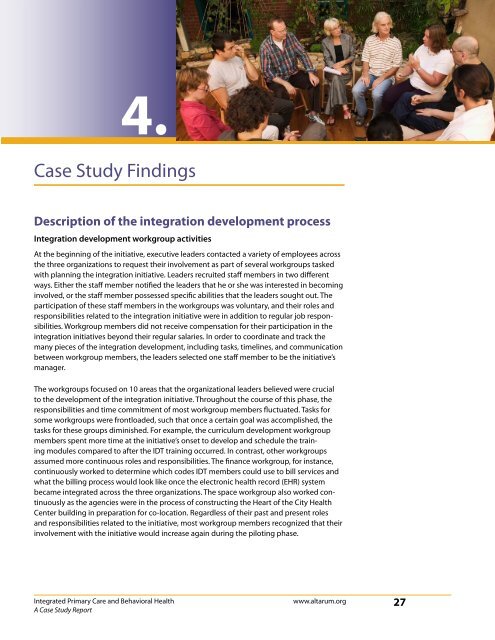A Case Study Report - Altarum Institute
A Case Study Report - Altarum Institute
A Case Study Report - Altarum Institute
You also want an ePaper? Increase the reach of your titles
YUMPU automatically turns print PDFs into web optimized ePapers that Google loves.
4.<br />
<strong>Case</strong> <strong>Study</strong> Findings<br />
Description of the integration development process<br />
Integration development workgroup activities<br />
At the beginning of the initiative, executive leaders contacted a variety of employees across<br />
the three organizations to request their involvement as part of several workgroups tasked<br />
with planning the integration initiative. Leaders recruited staff members in two different<br />
ways. either the staff member notified the leaders that he or she was interested in becoming<br />
involved, or the staff member possessed specific abilities that the leaders sought out. The<br />
participation of these staff members in the workgroups was voluntary, and their roles and<br />
responsibilities related to the integration initiative were in addition to regular job responsibilities.<br />
Workgroup members did not receive compensation for their participation in the<br />
integration initiatives beyond their regular salaries. In order to coordinate and track the<br />
many pieces of the integration development, including tasks, timelines, and communication<br />
between workgroup members, the leaders selected one staff member to be the initiative’s<br />
manager.<br />
The workgroups focused on 10 areas that the organizational leaders believed were crucial<br />
to the development of the integration initiative. Throughout the course of this phase, the<br />
responsibilities and time commitment of most workgroup members fluctuated. Tasks for<br />
some workgroups were frontloaded, such that once a certain goal was accomplished, the<br />
tasks for these groups diminished. For example, the curriculum development workgroup<br />
members spent more time at the initiative’s onset to develop and schedule the training<br />
modules compared to after the IDT training occurred. In contrast, other workgroups<br />
assumed more continuous roles and responsibilities. The finance workgroup, for instance,<br />
continuously worked to determine which codes IDT members could use to bill services and<br />
what the billing process would look like once the electronic health record (eHR) system<br />
became integrated across the three organizations. The space workgroup also worked continuously<br />
as the agencies were in the process of constructing the Heart of the City Health<br />
Center building in preparation for co-location. Regardless of their past and present roles<br />
and responsibilities related to the initiative, most workgroup members recognized that their<br />
involvement with the initiative would increase again during the piloting phase.<br />
Integrated Primary Care and Behavioral Health www.altarum.org 27<br />
A <strong>Case</strong> <strong>Study</strong> <strong>Report</strong>


